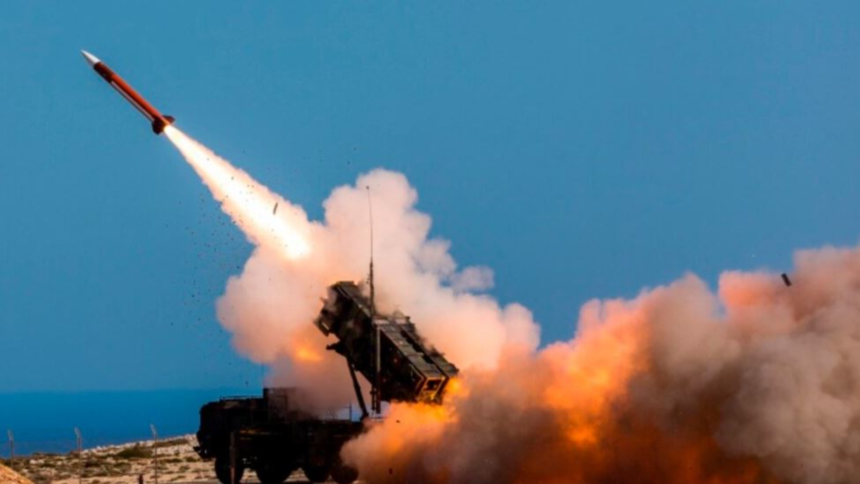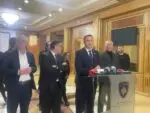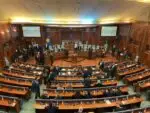Friedrich Merz, who is expected to become Germany’s Chancellor after his Christian Democratic Party won the parliamentary elections on February 23, stated that Europe may need to create an “independent” defense capability, as the United States has become “largely indifferent” to Europe’s fate.
A key priority of a new European defense mechanism would be to protect Ukraine, which has entered its fourth year of war against Russian aggression.
The country has survived thus far mainly due to the substantial military aid from the United States, provided during President Joe Biden’s term.
New President Donald Trump has said he wants to end the war and seek compensation for the U.S. military aid, even asking Ukraine to grant the United States access to the country’s mineral resources in exchange for tens of billions of dollars in American military assistance to Kyiv.
Andriy Zolotarev, director of the Third Sector Analytical Center, a think tank based in Kyiv, said that U.S. military aid is crucial for Ukraine’s defense.
“Specifically, the United States has large reserves of weapons, and they are an extremely important provider of intelligence information,” he said. “All European countries combined do not have more satellites than the United States. The United States has extremely important and truly irreplaceable weapons for Ukraine, such as Patriot missile defense systems, long-range ATACMS missiles, HIMARS rocket systems, as well as spare parts for armored vehicles and artillery systems. This cannot be underestimated in any way.”
According to expert Zolotarev, while Europe produces advanced weapons and other military equipment, the European Union and the United Kingdom could only partially compensate for what Ukraine would lose if the United States halts military assistance to Kyiv.
“Their efforts might soften the negative impact, but they wouldn’t avoid the severe consequences,” he said. “It would simply delay the end of the war. Europe is currently far from its best economic and military form.”
Mark Feigin, a Russian human rights activist and former lawyer, pointed out in an interview with Voice of America that while Europe has two countries with nuclear arsenals, the UK and France, and is collectively much wealthier than Russia, the continent’s military potential is hindered by the fact that it is not “a single entity.”
“The United States is more powerful, partly because decisions are made in a centralized manner, and they are then consistently implemented,” he said. “Europe’s potential is dispersed, and the political situation in EU countries is very unstable. All of this prevents Europeans from effectively utilizing their apparent advantages in confronting Russia.”
Who Will Pay for Ukraine’s Reconstruction?
Experts believe that the reconstruction of Ukraine after the war ends will eventually be funded by European private investments. According to some estimates, this could cost between $500 billion and $2 trillion. However, the longer the war continues, the harder it becomes to finance Ukraine’s reconstruction. But the main question remains: who will pay for it?
“It would be ideal for the Russian side to pay for this,” says economist Alexey Bayer. “There should be reparations or taxes from Russian exports of oil, gas, and other minerals.”
But according to expert Bayer, it is unlikely that any Russian government, “even one that comes after Putin, will voluntarily agree to pay reparations to Ukraine,” he told Voice of America.
While frozen Russian assets in Western banks, including tens of billions of dollars in foreign currency and gold reserves held by Russia’s central bank, could be used to rebuild Ukraine, this would require their full confiscation.
Many experts say neither the U.S. government nor European governments would take such a step, despite strong discussions about this option in the press.
“Freezing assets is a completely different thing from confiscating them,” says Alexander Cooley, a political science professor at Barnard College. “This legal battle is happening right now in the U.S. and EU countries and is constantly being contested because it’s an unfamiliar area.”
“I think the Trump administration would be less inclined to respond positively to calls for the confiscation of Russian assets, especially since it is moving to resolve the conflict, and one of Russia’s main demands is the unfreezing of its assets and the removal of most sanctions.”
Cliff Kupchan, chairman of Eurasia Group, a New York-based consulting firm, agrees that Europe is unlikely to support the seizure of frozen Russian assets.
“I think the Europeans will continue to oppose the idea of breaking international norms for reserves and are afraid that Russia will then confiscate the assets of Western governments and the private assets of Western countries,” he said.
And while Ukrainian President Volodymyr Zelenskyy, officials, and various Western experts have called for a “Marshall Plan” for the reconstruction of Ukraine—a reference to the massive U.S. aid program for rebuilding Western Europe after World War II—expert Kupchan believes that a U.S. initiative of such scale to rebuild Ukraine is unlikely.
“At the moment, the United States is not only uninterested, but they have also clearly stated opposition to this idea. President Trump thinks Ukraine is another example of how Europe uses American money.”
However, expert Cliff Kupchan believes that European investments for reconstruction will ultimately flow into Ukraine, especially if a ceasefire is reached that involves the deployment of Western peacekeeping forces there, reports VOA.
“I don’t think it will be that slow,” he said, referring to Ukraine’s post-war reconstruction. “Reconstruction won’t be as fast as if there were an initiative like the Marshall Plan, but it won’t be too slow either,” emphasized expert Kupchan.







